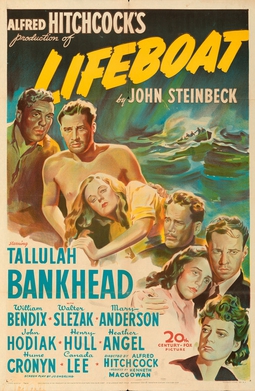Pages
▼
Saturday, July 9, 2016
Lifeboat (Alfred Hitchcock, 1944)
Lifeboat has two things going for it: Alfred Hitchcock and Tallulah Bankhead. Otherwise, it could easily have turned into either a routine survival melodrama or, worse, a didactic allegory about the human condition. As it is, elements of both remain. The situation -- a small group of survivors of a merchant marine vessel torpedoed by a German U-boat confront the elements, their own frailties, and the U-boat captain they unwittingly help rescue -- was dreamed up by Hitchcock and was assigned to John Steinbeck to come up with a story. It was then turned into a screenplay by Jo Swerling, with the uncredited help of a number of other hands, including Ben Hecht and Hitchcock's wife, Alma Reville. Steinbeck is said to have hated it, partly because the screenplay was purged of his leftist point of view, but anyone familiar with his fiction can see how the script's avoidance of his tendency to preach strengthened the film. And the casting of Bankhead, in what is virtually her only good screen role, adds a note of sophisticated sass that the melodrama desperately needs. Steinbeck also objected that the character of Joe (Canada Lee), the ship's steward and the only black survivor, had been turned into a "stock comedy Negro," which is hardly fair: Although there are unpleasant taints of Hollywood racism in the characterization -- Bankhead's character refers to him as "Charcoal" a couple of times -- Joe is generally treated with respect. At one point, when the occupants of the lifeboat decide to put something to a vote, Joe asks, with more than a touch of sad experience behind the question, "Do I get to vote, too?" And when the survivors finally turn in a frenzy on the treacherous German (Walter Slezak), clubbing him to death and drowning him, Joe is the only one who seems to recognize that what they're doing is essentially a lynching; he tries to dissuade Alice (Mary Anderson), the U.S. Army nurse, from joining the assault. (Of course, it's also possible that the studio feared that having a black man assault a white man would outrage Southern audiences.) While it's not prime Hitchcock, Lifeboat is engaging and entertaining, and a cut above most wartime melodramas, partly because it dares to present the enemy, the German captain, as dangerous, cleverly outwitting and manipulating the Americans and Brits in the boat -- which naturally outraged some of the flag-waving critics.
Charles Matthews
